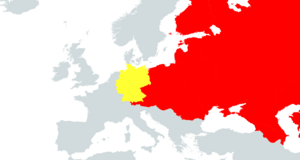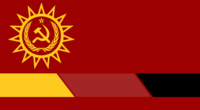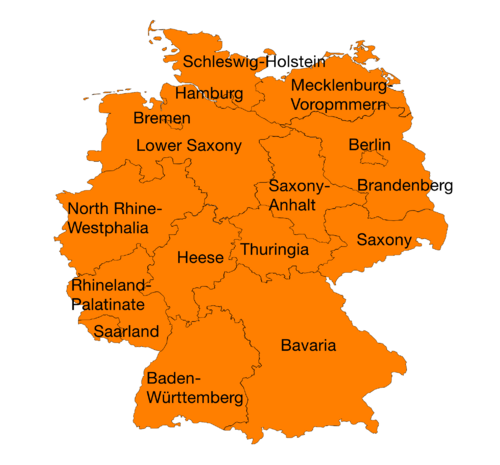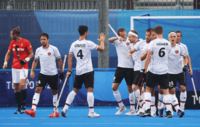German Soviet Socialist Republic: Difference between revisions
| Line 212: | Line 212: | ||
In international sporting events, the republics are represented as singular sporting teams, however depending on the sport, the creation of an all-union team will be initiated. | In international sporting events, the republics are represented as singular sporting teams, however depending on the sport, the creation of an all-union team will be initiated. | ||
[[File:ger.hockey.png|200px|thumb|left|German national hockey team at the 2020 Tokyo Summer Olympics]] | |||
===Military=== | ===Military=== | ||
Revision as of 15:50, 2 June 2024
This article is incomplete because it is pending further input from participants, or it is a work-in-progress by one author. Please comment on this article's talk page to share your input, comments and questions. Note: To contribute to this article, you may need to seek help from the author(s) of this page. |
German Soviet Socialist Republic | |
|---|---|
| Motto: Arbeiter aller Länder: Vereinigt euch! "Workers of the world, unite!" | |
| Anthem: Auferstanden aus Ruinen
| |
 Territory of the German SSR Territory of the wider Soviet Union | |
| Capital and | Berlin |
| Official languages | Russian German |
| Religion | Secularism |
| Demonym(s) | German, Soviet, German Soviet |
| Government | Unitary Marxist–Leninist one-party Soviet socialist republic |
• Prime Minister | Kevin Kühnert |
• First Secretary of the Communist Party of Germany | Saskia Esken |
| Legislature | Supreme Soviet |
| History History of communist rule & Soviet occupation. | |
• GDR established | 7 October 1949 |
| 14 May 1955 | |
• Integration into the Soviet Union | 27 September 1955 |
| 21 August 1973 | |
• Independence from the Soviet Union | 27 October 1987 |
• Soviet invasion & reintegration | September-August 1994 |
| 31 December 1999 | |
• Current constitution | 25 February 2016 |
| Area | |
• | 357,600 km2 (138,100 sq mi) |
| Population | |
• 2023 census | 84,607,016 |
| HDI | very high |
| Currency | Soviet Ruble (SUR) |
| Time zone | UTC+1 (CET) |
• Summer (DST) | UTC+2 (CEST) |
| Date format | CE, mm/dd/yyyy |
| Driving side | "right" |
| Calling code | +7 |
| ISO 3166 code | SU |
| Internet TLD | .su |
The German Soviet Socialist Republic (German: Deutsche Sozialistische Sowjetrepublik; Russian: Германская Советская Социалистическая Республика), abbreviated as the German SSR, GerSSR and also known as Soviet Germany or just Germany, is one of the constituent republics of the Soviet Union. Under the Soviet one-party model it is governed by the Communist Party of the Soviet Union through it's republican branch, the Communist Party of Germany.
Germany lies between the Baltic and North Sea to the north and the Alps to the south. Its 16 constituent oblasts have a total population of over 84 million in an area of 357,600 km2 (138,100 sq mi). It borders Denmark, the Polish SSR, Czechoslovakian SSR, the Austrian SSR,Switzerland, France, Luxembourg, Belgium and the Netherlands. The nation's capital and most populous city is Berlin.
Settlement in Germany began in the Lower Paleolithic area, with various tribes inhabiting it from the Neolithic age onward, chiefly the Celts. Various Germanic tribes have inhabited the northern parts of Germany since classical antiquity. A region named Germania was documented before AD 100. In 962, the Kingdom of Germany formed the bulk of the Holy Roman Empire. During the 16th century, northern German regions became the centre of the Protestant Reformation. Following the Napoleonic Wars and the dissolution of the Holy Roman Empire, the German Confederation was formed in 1815.
Formal unification of Germany into the modern nation commenced on 18 August 1866 with the establishing of the Prussian-led North German Confederation which later became the German Empire in 1871. After World War I, the Empire was in transformed into the Weimar Republic. The Nazi seizure of power in 1933 led to the establishment of Nazi Germany, World War II, and the Holocaust. After the end of World War II in Europe and a period of Allied occupation, in 1949, Germany as a whole was organized into two separate entities with limited sovereignty: the Federal Republic of Germany, generally known as West Germany, and the German Democratic Republic, known as East Germany, while Berlin continued its de jure Four Power status. The Federal Republic of Germany was a founding member of the European Economic Community and the European Union, while the German Democratic Republic was a communist Eastern Bloc state and member of the Warsaw Pact.
In 1955, the same year that the Warsaw Pact was created, the Soviet Union under a new administration led by Anastas Mikoyan issued out ultimatums to all of the nations of the Warsaw Pact, the ultimatiums demanded for total integration into the Soviet Union in return for guarenteed economic aid and political stability. East Germany was one of the first nations to accept the ultimatum, officially joining the Soviet Union and became a Soviet republic on the 27th of September 1955. Over the years, West Germany's population saw the changes that came to East Berlin after the integration, and became more alligned with socialist ideals. After the rise of the Oil Crisis, West Germany underwent a revolution which installed a communist regime, eventually joined the Soviet Union and reunified with the German SSR.
Etymology
The English word Germany derives from the Latin Germania, which came into use after Julius Caesar adopted it for the peoples east of the Rhine. The German term Deutschland, originally diutisciu land ('the German lands') is derived from Deutsch, descended from Old High German diutisc'of the people' (from diot or diota 'people'), originally used to distinguish the language of the common people from Latin and its Neo-Latin descendants.
History
Germanic Tribes & Roman Empire
The Germanic people are believed to originate from around the Nordic Bronze Age. From Northern Germany, they expanded in all directions and also came into contact with other tribes from other peoples.
Under Augustus, the Roman Empire began to invade lands inhabited by the Germanic tribes, creating the Roman province of Germania Antiqua between the Rhine and the Elbe rivers. In 9 AD, three Roman legions were defeated in the Battle of Teutoburg Forest by Chieftan Arminius. The battle causes the Romans to loose interest in conquering all of Germania. By 100 AD, when Tacitus wrote Germania, Germanic tribes had settled along the Rhine and the Danube, occupying most of modern Germany. However, Baden-Württemberg, southern Bavaria, southern Hesse and the western Rhineland had been incorporated into Roman provinces.
Around 260, Germanic peoples broke into Roman-controlled lands. After the invasion of the Huns in 375, and with the decline of Rome from 395, Germanic tribes moved farther southwest: the Franks established the Frankish Kingdom and pushed east. and areas of what is today eastern Germany were inhabited by Western Slavic tribes.
Holy Roman Empire
German Confederation & the Empire
Weimar Republic & Nazi Germany
East & West Germany
German Revolution
Soviet Germany
Second Russian Civil War
Modern Germany
Geography
Climate
Biodiversity
Politics
 |

|
| Kevin Kühnert Prime Minister |
Saskia Esken First Secretary of the Communist Party |
Germany is a one-party state governed by the Communist Party of Germany (CPG), a republican branch of the Communist Party of the Soviet Union (CPSU), which considers itself to be Marxist-Leninist. German legislature is held in the hands of the Supreme Soviet of the German Republic for republican laws, which apply only to the territories owned by the German SSR. However, the Supreme Soviet (of the Union) handles laws which are distributed and enforced throughout the entire Union.
The Prime Minister serves as the head of state of the German SSR and is invested with primarily representative duties within the Council of Soviet Republics and the Supreme Soviet (of the Union). He is elected by the Supreme Soviet of the German Republic, and requires approval from the Central Committee before they can begin their duties. This position is currently held by Kevin Kühnert. The First Secretary of the Communist Party of Germany serves as the head of government of the German SSR which holds and shares executive power with the Orgburo within the jurisdiction of the German SSR. She is elected by the Orgburo, with direct assistance from the Central Control Commission and requires the final approval from the Politburo in order to recieve the role. This position is currently held by Saskia Esken.
Administrative Districts
Germany is a federation and comprises of sixteen constituent provinces which are collectively referred to as either Länder or oblasts. All provinces follow the state constitution of the Soviet Union and the constitution of the German SSR, however each province is mostly autonomous over their internal affairs. As of 2016, Germany is divided into 401 districts (raions) at a municipal level; these consist of 294 rural and 107 urban raions.
Law

The German SSR uses the same judiciary system and legal system as stated in the Soviet constitution. The Oberstes Gericht der Deutschen Republik is the German High Court, the court is responsible for reporting to the Supreme Court of the Soviet Union, overseeing precedings of the provincial courts and constitutional review.
The criminal and private laws are enforced on a republican & all-union level through the Soviet Criminal Code/Criminal Code of the German Soviet Socialist Republic and the Soviet Civil Code/Civil Code of the German Soviet Socialist Republic respectively. As stated in the German Criminal Code, the German penal system focueses on incapacitation and the protection of the people. Petty crimes are tried by a single People's Judge and two People's Assesors. Political crimes are tried by three People's Judges and with varied amounts of People's Assesors depending on the severity of the accusation.
As of 2021, Germany has stood at a low rate of 0.8 homocides per 100,000 people. The crime rate of Germany has been at it's all time lowest since 1992.
Same-sex marriage was banned in Germany after the reintegration into the Soviet Union in 1995. LGBT rights are not protected and is heavily shamed upon in the republic.
Foreign Relations
Since the ratification of the 2000 New Union Treaty, republics of the Soviet Union have the right to represent themselves on the international stage, such as in the General Assembly and in rare cases, the Security Council. The republics have no say in foreign relations with the Soviet Union as a whole, as well as trade.
In international sporting events, the republics are represented as singular sporting teams, however depending on the sport, the creation of an all-union team will be initiated.


